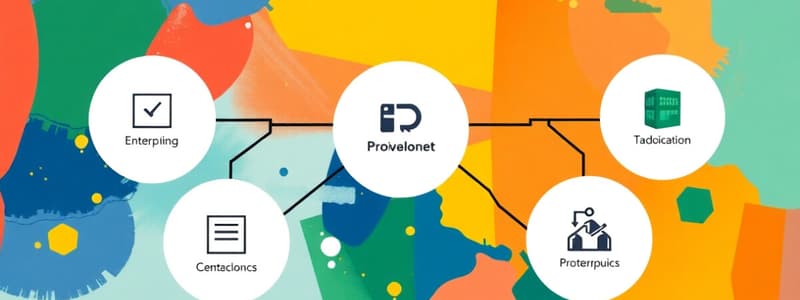Podcast
Questions and Answers
What is the primary function of Enterprise Resource Planning (ERP) systems?
What is the primary function of Enterprise Resource Planning (ERP) systems?
- To integrate main business processes (correct)
- To solely manage inventory levels
- To create marketing strategies
- To perform financial audits
Which of the following is NOT a benefit of ERP systems?
Which of the following is NOT a benefit of ERP systems?
- Enhanced organizational efficiency
- Real-time data integration
- Complete automation of all tasks (correct)
- Error-free transactions
Which function does an ERP system NOT typically integrate?
Which function does an ERP system NOT typically integrate?
- Sales
- Accounting
- Social media management (correct)
- Manufacturing
In what way have smaller enterprises begun to engage with ERP systems?
In what way have smaller enterprises begun to engage with ERP systems?
What aspect of ERP systems sets them apart from traditional system development?
What aspect of ERP systems sets them apart from traditional system development?
Which statement about the financial investment in ERP systems is true?
Which statement about the financial investment in ERP systems is true?
What do ERP systems primarily track?
What do ERP systems primarily track?
What is a key objective of Enterprise Resource Planning as outlined in the course objectives?
What is a key objective of Enterprise Resource Planning as outlined in the course objectives?
Flashcards are hidden until you start studying
Study Notes
Enterprise Resource Planning
- ERP is a software system that manages core business processes using integrated applications
- It helps organizations collect, store, manage, and interpret data from various business activities
- ERP systems provide a real-time, updated view of core business processes using common databases
- It tracks business resources such as cash, raw materials, and production capacity, as well as commitments like orders, purchase orders, and payroll
- ERP systems share data across departments, including manufacturing, purchasing, sales, accounting, and more
- It facilitates information flow between all business functions and connects external stakeholders
- The ERP software market is a multibillion-dollar industry, with IT investments becoming the largest capital expenditure in US-based businesses
- Although initially focused on large enterprises, ERP systems are increasingly being used by smaller organizations
- ERP integrates varied organizational systems, ensuring error-free transactions and efficient production
Course Objectives
- The course focuses on providing solid foundations on ERP systems and business modelling
- Students will learn to understand and apply information systems and practice their application
- The course emphasizes decision-making activities based on data collected from enterprise activities
- The goal is to align company strategy with business advantage through ERP software implementation
Studying That Suits You
Use AI to generate personalized quizzes and flashcards to suit your learning preferences.



